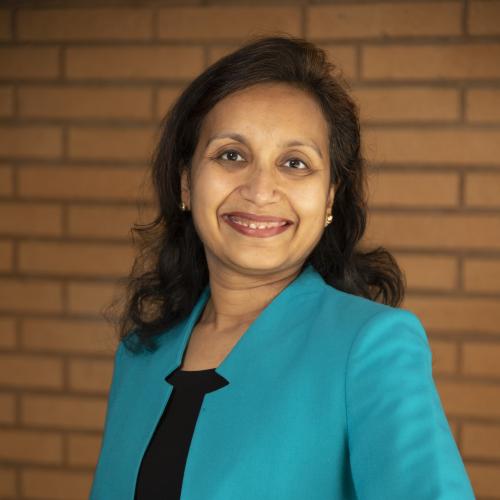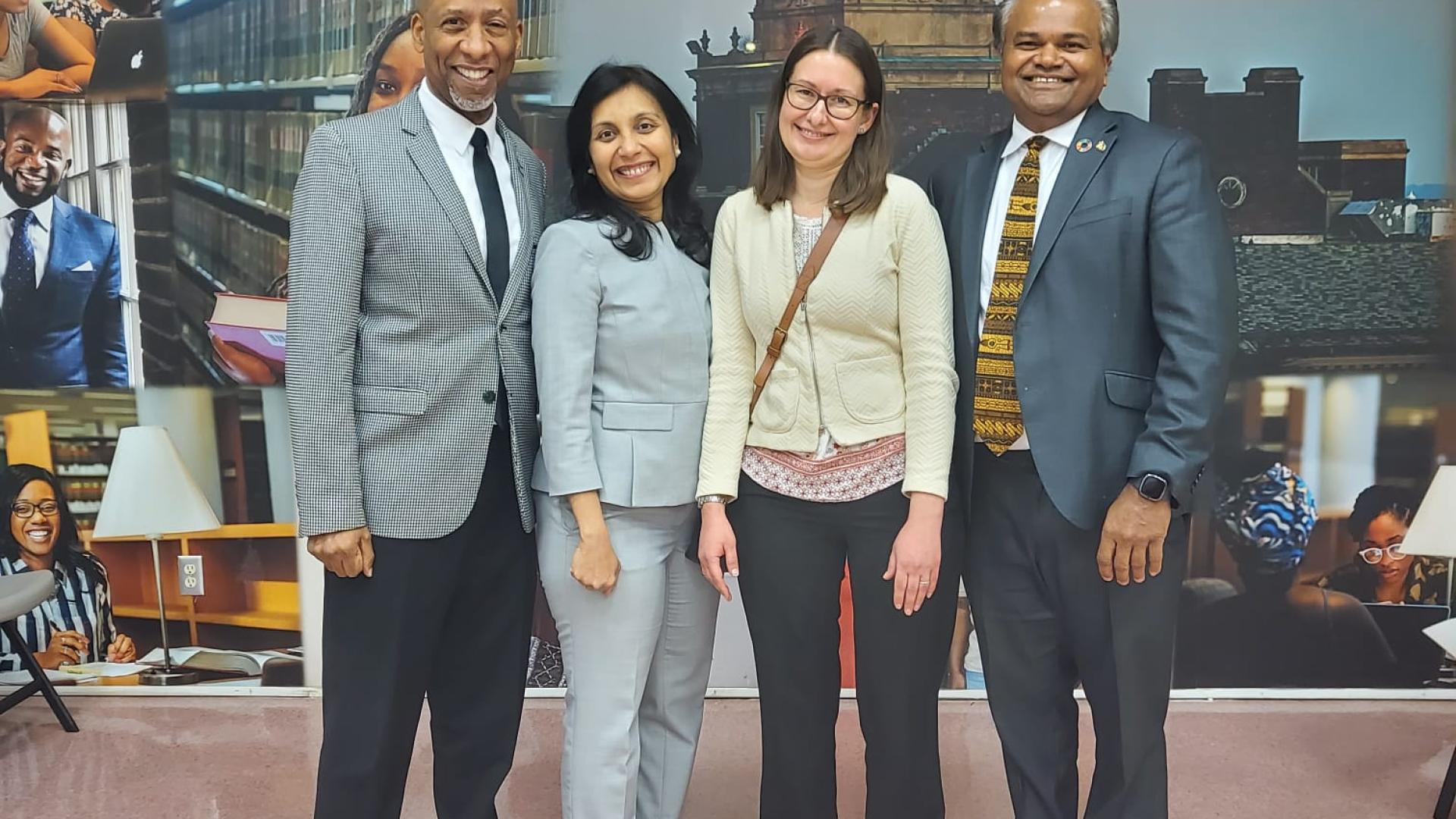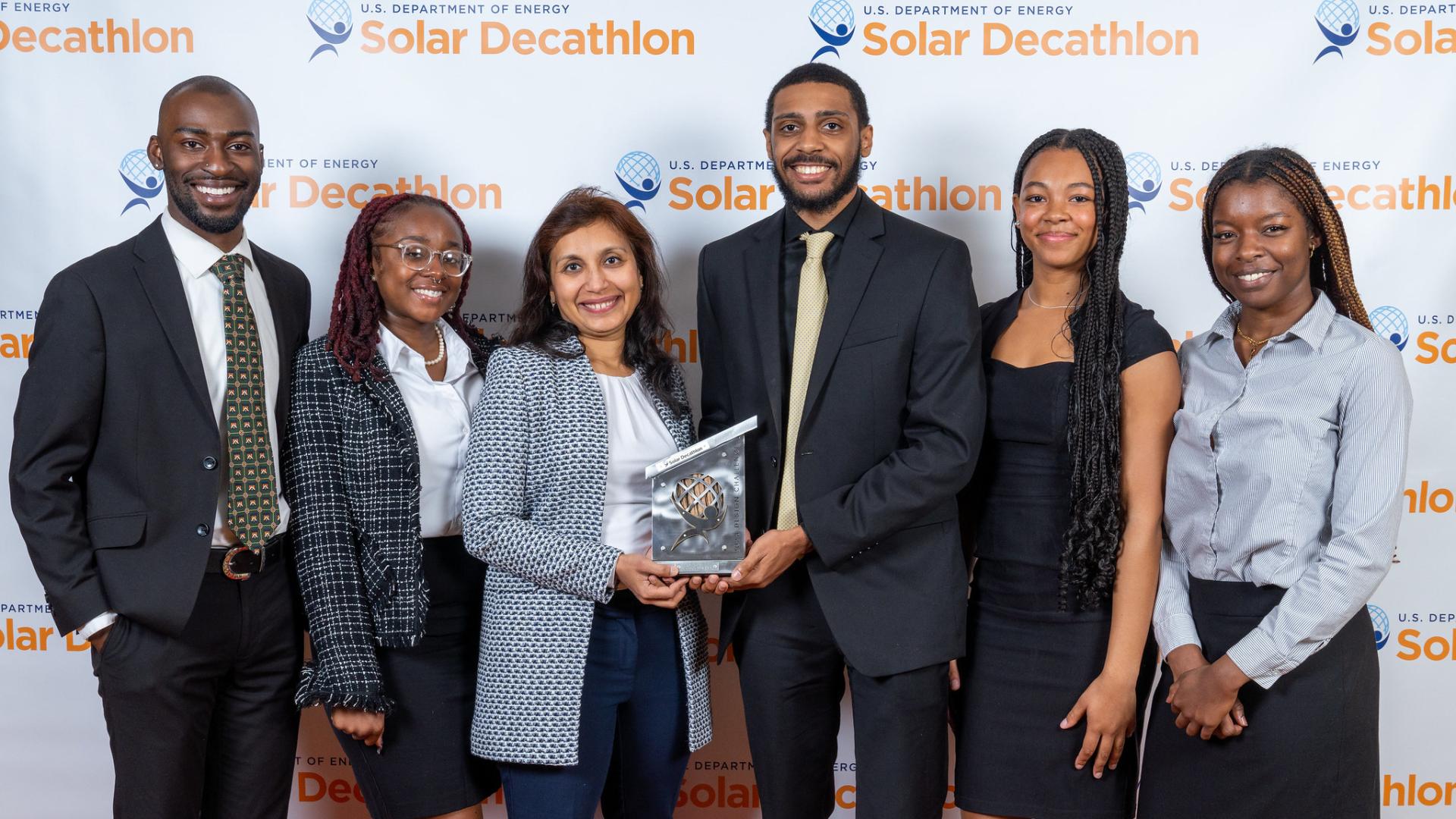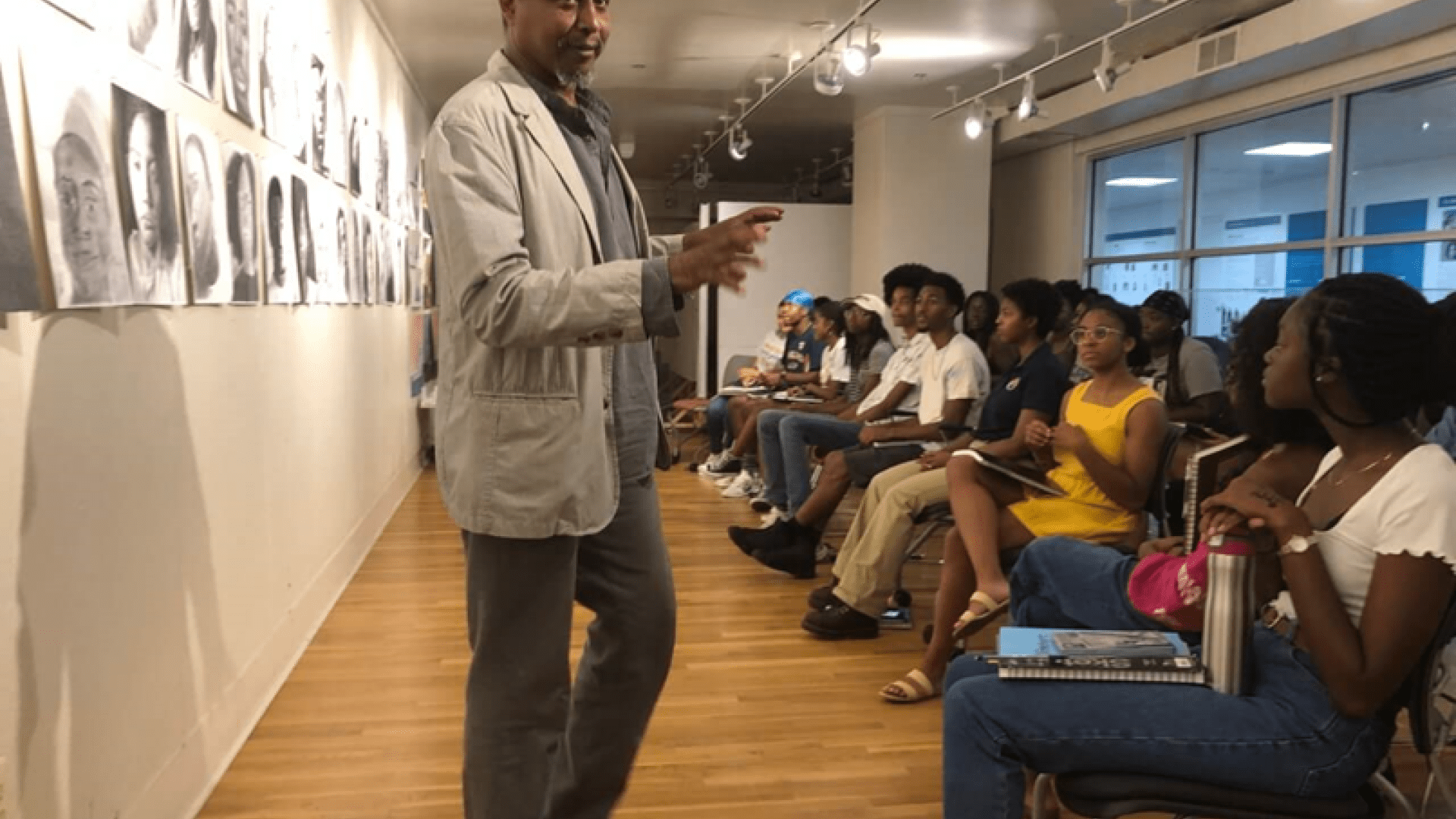Master of Architecture (M.arch)
Architecture and Environmental urban planning
Anna University, Chennai (India)
1998

Nea Maloo is an assistant professor teaching environmentally sustainable systems, decarbonization, and professional practice in the Department of Architecture. Maloo primes HBCU students for leadership, creating an essential pipeline for diversity and environmental justice. Her inclusive teaching integrates global equity with climate action and transforms architectural education to advance the profession worldwide.
She is an assistant professor at Howard University and teaches environmental systems, decarbonization, and professional practice classes at Howard University. Her research includes the intersection of reducing carbon footprint and environmental justice. Maloo is an educator currently teaching Design Studio, Structures, Environmental Systems and Professional Practice classes at Howard University. She also believes that architecture is contextual and encourages her students to travel to gain experience, initiating a travel led education to South Asia. Her research is Architectural resilience, Biomimicry, structures, building science, climate, sustainability for all, equity in health and biophilia in Architecture. She is published several papers and spoken in both local and national seminars. She is a robust role model and has presented at several local and national conventions on architecture, women, equity, decarbonization, and sustainability and was recently elevated to the Fellow is AIA.
Maloo is the founder and principal architect of Showcase Architects, an award-winning practice focused on environmental architecture, carbon planning, and biophilic design. The firm's design philosophy explores modern architecture through a spatial, material, and. Her expertise is in providing innovative design solutions to complex technical projects. Her practice focusses on decarbonization of buildings and material equity. She is an active member of the AIA, NCARB, and NOMA and serves as a president of the Building Technology Educators' Society (BTES).
Architecture and Environmental urban planning
Anna University, Chennai (India)
1998
Architecture
Anna University, Chennai (India)
1996
Buildings emit to almost 40 % of emissions. Maloo teaches course and practices how to decarbonization of buildings and serve the community.
Building Science and Technology, Biophillia, Ecology and Architecuture, Sustainability and design, Equity, Environment and Design , Women in Arhcitecture and Professional Practice
The core strength of Building is the structure and its systems. All the courses I teach arweaved with sustainbilty and applications in design .
It is the intersection of Ecology with buildings. We explore Biophillia, Urban ecology and Biomimcry.The class is reserch led to see how nature can inform to design healthy buildings and how buildings can be in harmony with nature.
The core course, which molds the student to the real professional world. The course objective to give the student to be enterprenure and explore ethics . The course also explores the business of Architecuture along with the the law of copywright and professionalism with licensure.
The course will be a new inter-disciplinary course in the College of Engineering and Architecture for architects, engineers, and environmental studies major students. This course is intended to bring principles of environmental justice to empower students with the knowledge, and expertise to be leaders in sustainability. The course aims to put sustainable building practice at the center of environmental health, justice, and social equity. The great Nelson Mandela said” Education is the most powerful weapon which you can use to change the world.” This course will create the Environmental justice by having students of color be leaders in the field of sustainability. There is a vital need for such a course at Howard University, to shape their careers in community as leaders of sustainability. The multi-disciplinary students will address social, economic, and practical methods for building and community design specifically for people of color
Principal Investigator: “Student Training in Applied Research (STAR) Program”, National Renewable Energy Laboratory, U.S Department of Energy, 89,900, 2023-2024 Student research,- LCA of a fungi-based insulation product and Life Cycle Assessment” NREL, U.S Department of Energy, 89,900, 2023-2024
Principal Investigator: HBCU clean energy Education Prize, partnership track, with Carlton Waterhouse, Dr. Janelle Burke, Dr. Amy and Drexel University, ongoing, 2023-2025
Principal Investigator: Howard University, Environmental justice and education EPA grant, “VERE-LCA: Validating and Expanding Research and Education for LCA Policy, University of Washington, Howard University, and UC Berkeley, with PNNL, $1.20000, 2023-27
Energy Education Prize, Partnership Track, DOE, 2023, $100,000, Funded
Principal Investigator: Healthy Building Network: Plan and implement student-designed research projects that address the human and environmental health impacts of building materials, especially in the context of affordable housing design and environmental justice implications of materials (2021-22). Student research, “Climate Change & the Material Disparity in Underdeveloped Communities”.
Team Member Dr Marin C., PI, Civil Engineering, Howard University, University of Kentucky and Southern Illinois University: “Infrastructure Safety Monitoring“, Civil Engineering Department, NSF Convergence Accelerator, awarded 2020-21, Infrastructure Safety Monitoring with Artificial Intelligence (ISMwithAI)
Co-Principal Investigator: Dr. Mosleh, M, PI, Howard University”, “Industry- research inclusion in STEM education (I-RISE)”, Department of Education, awarded 2019-2020, https://howardirise.wixsite.com/mseip-irise.1st, 2020; Project Bid: $300,000
Clean Energy Community
High Performance buildings and Equity
Decarbonization
Ecology and Architecture
Elevated to the Fellows Institute of Architects for the global notable contributions to the architecture profession, a distinction only earned by 3% of the American Institute of Architects (AIA) members. There are currently over 95,000 AIA members nation
The Environmental Justice (EJ) + Health + Decarbonization will be a new inter-disciplinary course in the College of Engineering and Architecture, Howard University, for architects, engineers, and environmental studies major students. The course aims to put sustainable building practice at the center of environmental health, justice, and social equity. This course is intended to equip the students with the knowledge of building decarbonization and environmental justice, to be the future leaders in sustainability.
Pioneer educator award from Planning and visual education for contribution to the society and design
The U.S. Department of Energy’s (DOE) Office of Energy Efficiency and Renewable Energy awarded its first-ever Zero Energy Design Designation (ZEDD) seal of recognition to Howard University for its Master of Architecture program with an equitable high-performance energy design concentration.
Earned by only 12 collegiate institutions worldwide, this inaugural designation distinguishes post-secondary academic programs that impart the best practices of zero-energy design on students and require them to apply those building science concepts in actual projects. These leading educational programs are recognized by the DOE for preparing tomorrow’s architectural and engineering leaders to design and build the most sustainable buildings possible.
Read: Stanford | Stanford and Howard universities collaborate on cutting-edge sustainable building course
Read: WBUR | Howard University students imagine new life for New Bedford firehouse
Listen: Is It Hot Enough for Ya? Podcast | Nea Maloo on Architecture & Sustainability. The Innovation in Sustainable Design
Transformation: Educational Architecture Strengthens Communities
This paper documents the ideas that we presented at the Fall 2023 NOMA-Unplugged Conference, in Nashville, TN. In the session, challenged the audience to consider the following thought: Akin to bridges, our public schools might be considered critically important infrastructure. Across the United States and the European Union, they are central to civic life. They create and sustain communities and contribute to continuous improvement
Strategic methods of Integrating Building Science and Design
This paper questions how can we envision building science and studio courses as a Yin and Yang relationship where one can’t exist without the other? How can the integration lead to more successful understanding of concepts taught in building sci- ence courses? How can the work being done in design studio be used as a teaching tool in the building science courses and vice versa? What are the best practices for achieving this integration?
Analysis of impact of Window design detail on energy demand profile of typical hotel in Chapter 54 of ISBS 2019 - 4th International Sustainable Buildings Symposium
Building Decarbonization: Theory to Practice; Book Chapter in Teaching Carbon Neutral Design in North America
The chapter examines the development of the course “Building Decarbonization: Theory to Practice” in the accredited degree program at Howard University. The outcomes of the course and its effects within the curriculum and globally are articulated within this chapter. The outreach of future courses will upskill the architectural education and profession to meet the needs of society. The course demonstrates interdisciplinary and multi-institutional collaborations to reshape the architecture curriculum, merging design and performance with climate justice and carbon reduction. This dynamic synthesis creates a robust infrastructure that redefines the potential of academic thinking.
Maloo, N. “Open and nature guided, healthy buildings”, Summer Academy Howard University (A’20),
Maloo, N. “Virtual Ethics”, NCARB pro-practice roundtable, Innovative Teaching (A’20), Maloo, N. & Dahlia (2019-20)
“Strategic methods of Integrating Building science and Design?,” published at the 108-annual meeting, ACSA Association of Collegiate Schools of Architecture
Accepted and Presented “ Biophilic design for positive health outcomes “, NOMA national conference, 1.5 HSW, speaker, Brooklyn, New York Maloo, N. & Onyango, J. , University of Notre Dame);
“Analysis of impact of Window design detail on energy demand profile of typical hotel” presented at the 4th International Sustainable Buildings Symposium (ISBS2019) Dallas/ Texas July 18-20
Accepted and Presented “ Biophilic Architecture- for better outcomes “, Howard Research week 2019, Education and Outreach Maloo, N & Alfonzye Chisholm ( Director, Office of Sustainability, Howard university)
“Sustainability from university to students”, Architecture Exchange East taking place Nov. 7–9, 2018, at the Greater Richmond Convention Center in Richmond, Virginia.
Maloo, N & Katherine Williams “Architects roadmap for being developer”, Architecture Exchange East taking place Nov. 7–9, 2018, at the Greater Richmond Convention Center in Richmond, Virginia
"Healing of patients with Nature's positivity and Social distraction " has been accepted for 2018 HIBR Conference. - Health in Buildings for Today and Tomorrow, NIH(National Institute of Health) Making Connections July 17,2018





Large buildings are a significant source of greenhouse gas emissions. But as CBS News' Natalie Brand shows us, future architects at Howard University in Washington D.C. hope to shrink the size of those carbon footprints.